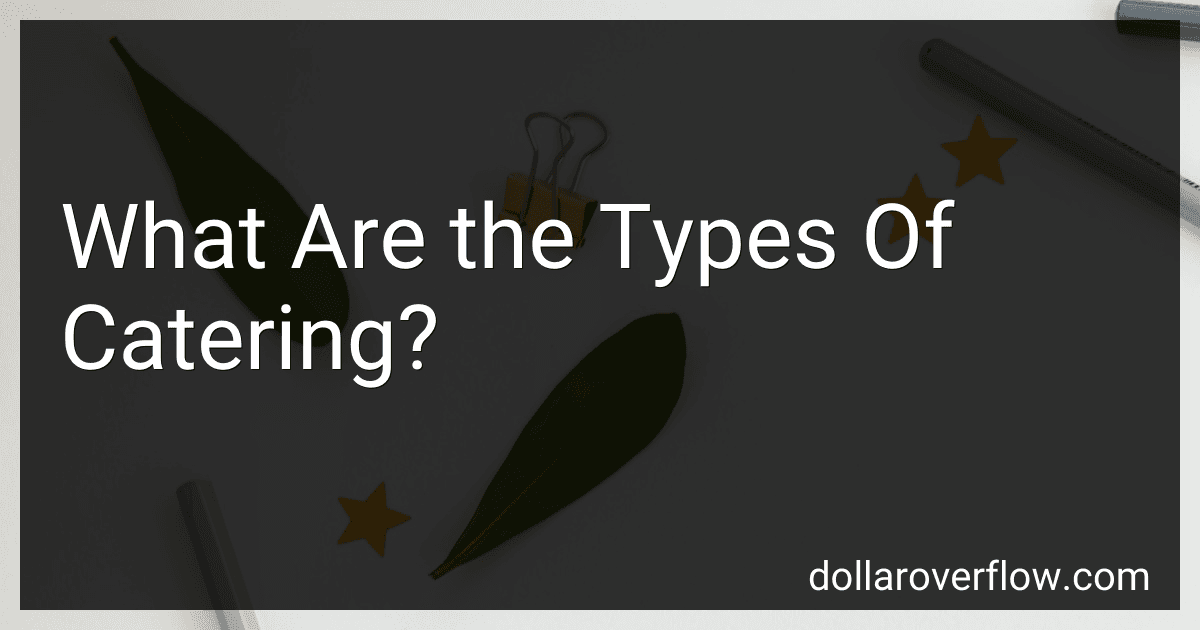Catering can be categorized into various types based on the services provided and the style of food service. Some common types of catering include on-premise catering, off-premise catering, corporate catering, wedding catering, social event catering, and mobile catering. On-premise catering involves providing food and beverages at a specific venue, while off-premise catering delivers food to a location chosen by the client. Corporate catering typically involves providing food for meetings, conferences, and office events. Wedding catering focuses on providing food and beverage services for weddings, ranging from intimate gatherings to large ceremonies. Social event catering caters to various events such as birthday parties, anniversaries, and family celebrations. Mobile catering involves serving food from a mobile kitchen or food truck at different locations or events. Each type of catering offers unique services to meet the specific needs of clients and events.
How to handle dietary restrictions with catering services?
- Communication is key: When you first start working with a catering service, be sure to clearly communicate any dietary restrictions or allergies that you or your guests may have. This will allow the catering service to plan accordingly and provide suitable options.
- Provide detailed information: Be specific about the dietary restrictions, including any ingredients that should be avoided, preferred alternatives, and any cross-contamination concerns. The more information you can provide, the better equipped the catering service will be to accommodate your needs.
- Request special menu options: Many catering services are able to provide customized menu options for those with dietary restrictions. Requesting special dishes or substitutions in advance can help ensure that everyone is able to enjoy the meal.
- Consider a buffet or stations setup: If you have guests with varying dietary restrictions, consider opting for a buffet or stations setup where they can choose their own dishes. This can provide more flexibility and ensure that everyone is able to find something they can eat.
- Be flexible and open to suggestions: Catering services may have experience working with various dietary restrictions and can offer creative solutions to accommodate your needs. Be open to their suggestions and work together to come up with a menu that works for everyone.
- Follow up and confirm: Before the event, be sure to follow up with the catering service to confirm that your dietary restrictions have been noted and are being accommodated. This will help avoid any last-minute surprises on the day of the event.
How to plan a menu for a catered event?
- Determine the type of event: Consider the theme, formality, and purpose of the event. Is it a casual gathering, a formal dinner, a wedding, a corporate meeting, or a holiday party? This will help determine the style of food and beverages to serve.
- Know your audience: Consider the preferences, dietary restrictions, and cultural background of your guests. Make sure to offer a variety of options to accommodate different tastes and dietary needs, such as vegetarian, vegan, gluten-free, or nut-free options.
- Set a budget: Determine how much you can spend on food and beverages. This will help you decide on the type and quantity of food to serve.
- Plan the menu: Start by selecting a main course and then build around it with appetizers, sides, desserts, and beverages. Consider a mix of hot and cold dishes, as well as different textures, flavors, and colors to create a balanced and appealing menu.
- Consider the logistics: Think about the time of day, duration of the event, and the serving style (buffet, plated meal, family-style, passed hors d’oeuvres). Make sure the menu is practical and can be easily prepared and served on the day of the event.
- Get creative: Consider incorporating seasonal ingredients, ethnic cuisines, or unique dishes to make the menu more interesting and memorable for your guests.
- Consult with a professional caterer: If you are unsure about planning the menu on your own, consider hiring a professional caterer who can help you create a customized menu based on your preferences and budget.
- Finalize the menu: Once you have decided on the dishes, beverages, and serving style, create a detailed menu with descriptions of each dish, allergen information, and dietary options. Share this menu with your caterer and any other vendors involved in the event.
What is the role of catering staff during an event?
The role of catering staff during an event is to provide food and beverage service to guests. This includes setting up and arranging food and drink stations, serving guests, replenishing food and beverages as needed, and cleaning up after the event. Catering staff may also be responsible for ensuring that food safety standards are met, coordinating with kitchen staff to ensure timely service, and accommodating any special dietary requests or preferences from guests. Overall, the catering staff plays a crucial role in ensuring that guests have a positive dining experience during the event.
What is the average lead time needed to book a catering company?
The average lead time needed to book a catering company can vary depending on the size and type of event, as well as the availability of the catering company. In general, it is recommended to book a catering company at least 1-3 months in advance for smaller events, and 6-12 months in advance for larger events such as weddings or corporate gatherings. This allows the catering company to properly prepare and organize the necessary resources and staff for the event. However, some catering companies may be able to accommodate bookings with shorter notice depending on their availability.
